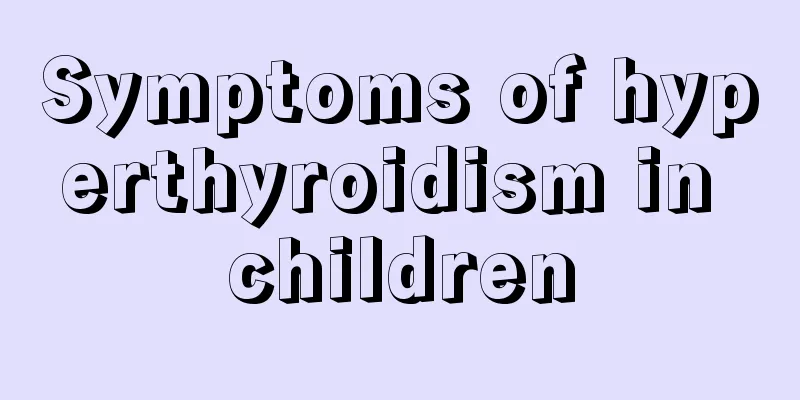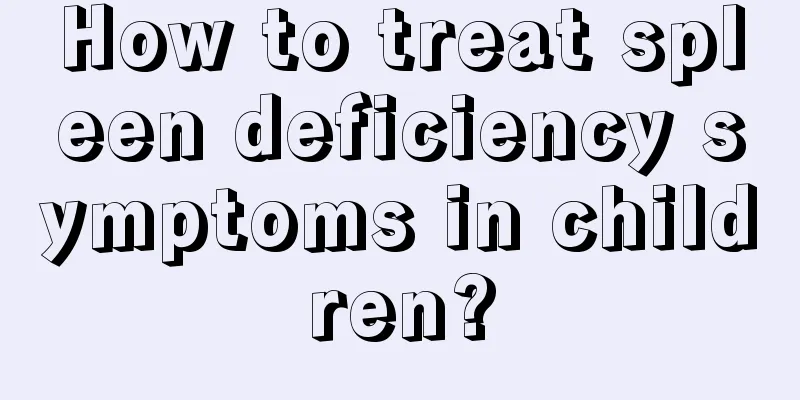Symptoms of hyperthyroidism in children

|
Many children are prone to hyperthyroidism. Many people do not have a deep understanding of this disease. They do not know why children suffer from such a disease, nor do they know what symptoms children will have when they suffer from the disease. Hyperthyroidism is a thyroid disease. After the onset of such a disease, the child's physical development will be affected, with delayed development and a small and thin body. So what are the symptoms of Er Rong's hyperthyroidism? Most children develop the disease during adolescence, and it is rare for those < 5 years old. The clinical course of hyperthyroidism in children varies greatly from person to person. Generally, symptoms gradually worsen, and the time from the onset of symptoms to diagnosis is usually 6 to 12 months. The symptoms of this disease are not very obvious and progress slowly at the beginning. They often first present as mild behavioral changes such as emotional instability, inattention in class, irritability, hyperactivity and inattention. Typical symptoms and signs include: 1. Increased sympathetic nerve excitability An increase in basal metabolic rate is accompanied by symptoms such as weight loss, sweating, heat intolerance, low fever, increased appetite, increased frequency of bowel movements, sleep disorders and fatigue. Due to the overexcitement of the sympathetic nervous system, the heart rate increases and the temper becomes irritable. Older children often feel palpitations, and in severe cases, arrhythmias and atrial fibrillation may occur. There are often subtle and rapid tremors in both hands. 2. All children have an enlarged thyroid gland The degree of swelling varies, and is generally symmetrical on both sides. It has a soft texture and a smooth surface, with clear boundaries, and can move up and down with swallowing. A systolic murmur may sometimes be heard or a thrill may be felt over an enlarged thyroid gland. Nodular swelling can be felt as single or multiple nodules of varying sizes, hard texture. Sometimes patients experience discomfort and pressure in the neck, difficulty swallowing, and may have slow puberty, menstrual disorders, amenorrhea, and oligomenorrhea. 3. Eye changes Eye signs are unique manifestations of hyperthyroidism. Due to the protruding eyeballs, the patient often stares and rarely blinks. The upper eyelid is contracted and cannot fall immediately with the eyeball when the eye looks downward, and it is difficult to evert the upper eyelid. Eye signs also include widening of the palpebral fissure, eyelid edema, conjunctival edema, corneal congestion, etc. 4. Others There may be slow puberty development, menstrual disorders, amenorrhea and oligomenorrhea. Treatment measures include providing adequate carbohydrates and fats; appropriately increasing the intake of animal offal, fresh green leafy vegetables, or vitamin supplements; appropriately controlling the intake of foods high in fiber; replenishing adequate water, avoiding stimulant beverages, and appropriately controlling diet after the condition has improved. You should also follow the doctor's instructions and choose medicines reasonably. Pay more attention to your child's condition. Above we introduced the various symptoms of hyperthyroidism in children. At the same time, we also proposed some treatment plans. If you don’t know how to deal with your child’s disease, you can choose to use the above methods to treat your child. When treating this disease, you must avoid improper diet for your child. When improving your child’s disease, you should give your child more high-protein foods. |
<<: What should children eat to strengthen their spleen and stomach?
>>: What are the symptoms of hypothyroidism in children?
Recommend
What to do if your child vomits after eating something cold
Although children's bodies are in the golden ...
What's wrong with a one-month-old baby who hasn't had a bowel movement for two days?
The baby's physique varies from person to per...
What should I do if my baby has a high fever and his temperature is sometimes high and sometimes low?
Babies often get sick due to their low immunity. ...
What are the effects of dental fillings in children
It is best not to fill teeth for young children e...
How many days does a baby's viral fever last?
When a baby has a fever, we usually have to find ...
Why is my two-month-old baby breathing fast?
If a two-month-old baby has difficulty breathing ...
Oral anti-inflammatory drugs for children's trauma
Anti-inflammatory drugs can cure many abnormal di...
What are the clinical manifestations of precocious puberty?
Due to the fact that the current social life, die...
Symptoms of mild formaldehyde poisoning in infants
In modern times, many people get married with pre...
How to treat gingivitis in children?
Children who are teething are particularly suscep...
What should I do if my baby has a sore throat and a high fever?
Generally speaking, tonsillitis often occurs in c...
Can babies who are allergic to cow's milk replace their infant formula with soy milk powder?
Milk is an essential food for the growth and deve...
Is it normal for a nine month old baby to drool?
Female comrades who have become mothers will unde...
What should I do if my two-year-old baby sweats a lot when sleeping?
Generally speaking, children do not have strong e...
2-year-old baby vomits and has very smelly diarrhea
For parents, it is very important to pay attentio...









